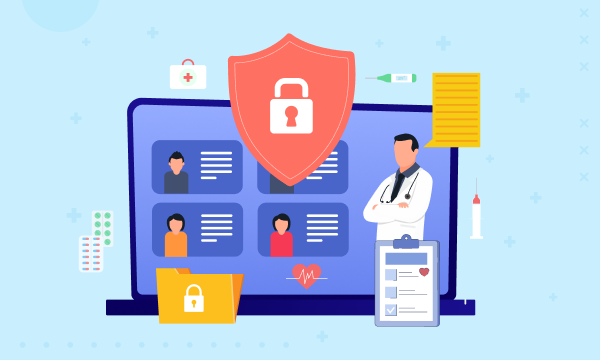Healthcare has drastically changed over the years. New inventions and researches keep healthcare always a hot topic. In addition, digital health is a recent breakthrough in primary care delivery.
However, digital technology includes wireless devices, electronic health records, telemedicine, big data, and so on.
While, doctors, practitioners, nurses, patients, researchers, and developers are the stakeholders included in the digital field.
As a result, digital health plays an important role in healthcare which varies from care delivery to medication.
So far, it has become a necessity now as the digital transformation of healthcare has taken place all over the world after the Cold-19. The usage of digital health tools has increased in response to that and the users are in the same proportion as well.
As per the report, around 90 percent of American adults use some kind of digital health tools such as an app or wearable device.
So let’s dive into the blog and go through some of the interesting facts about digital health…
What is digital health?
As you know about digital health, you might use digital health tools in your day-to-day health activities. It Isn’t a new concept but the users are already aware of it and can directly jump to another section of benefits of digital health. And if digital health is a new concept for you then continue reading…
Let’s go understand what it is and how it works.
Digital health is information and communication technology to provide digital support in the prevention of diseases and improve care delivery.
How does it work?
Digital health enables various tech tools such as electronic health records which are optimized to store the critical data of patients and to share the data with healthcare professionals when needed.
The setup for digital health was slowly taking place before the pandemic but when the demand increased the process needed to boost up, As a result, Covid-19 boosted the digital transformation of healthcare.
Benefits of digital health:
The sure-shot example of digital health benefits is showcased during the pandemic. The world was dealing with deadly daisies. Meanwhile, healthcare professionals were in a complex and challenging situation.
Every day, they are facing numerous challenges in their profession. Among them, the biggest problem was treating the patients.

As a result, digital health solutions like telemedicine, medical practice management software, electronic health record, mhealth, and so on support healthcare professionals to provide effective care delivery to patients who are far away from their radar. Similarly, patients can get treatment in their comfort zone.
Top 5 digital technology
The right technology can make your business reach new heights. Using this technology to build your mhealth can enhance your care delivery.
Mhealth is a combination of this digital technology, one can integrate this technology into their mhealth app.
#1 API-based app:
API is used by all digital transformation platforms that connect two or more systems and allows data exchange.
Big healthcare firms have various healthcare systems and most importantly, handling and managing that data system is overwhelming for them.
But with the integration of API, all the individual systems would be operated under one umbrella. In addition, it enhances workflow, improves productivity, prevents system interruption, and reduces cost.
#2 internet of things(IoT):
The Internet of things is sensor-based technology that is built to connect and exchange data. The technology links to the main server and extracts and stores the data.
Some of the most used IoT devices in healthcare are glucose meters, pulse trackers, and so on. IoT enables the transfer of real-time data of patients to healthcare professionals to monitor the symptoms of diseases.
#3 Artificial intelligence:
Artificial intelligence is also known as the human replacement nowadays. Because it is used for the task which is filled with efforts and challenges which are beyond human abilities and AI holds the potential to complete them in just a number of minutes.
It incorporates all the technologies we use today that include computer devices, smart apps, natural language processors, and voice assistants.
In addition, artificial intelligence allows healthcare firms to automate difficult tasks.
For instance, in drug discovery, there are numerous drug samples to test and accumulate the results of. Which is difficult and time-consuming through manual work, but using AI it can be completed in a number of minutes.
#4 Big data:
Without big data decoding large databases is a nightmare for any organization. Due to the complexity of data, traditional methods can not be used to crack the information.
As a result, big data decodes complex data and separates important information such as patient personal data and other administrative data. And provide real-time analysis.
However, The size of big data varies from terabytes to zettabytes.
#5 Cloud technology:
Cloud is an inevitable element of digital transformation that feeds scalability and flexibility to the organization. Handling a large database is difficult with the traditional method which is not cost-effective and secure.
As a result, cloud technology can help to store the large database of healthcare organizations with security.
The technology secures all the data under the roof of the cloud which reduce the hassle of finding heavy files and manually updating the system.
Challenges in digital health
Digital transformation has also upraised several challenges that impact healthcare professionals, technology developers as well as patients.

Due to massive issues in data breaches, patients are concerned about their data and other issues like accessing, sharing, and storing the data.
As in history, there are many technology development firms failed in building secure platforms for both doctors and patients. And the common reason is not following the health compliances like HIPPA complaint task management.
Unless it has been adopted and utilized the patient does not feel ensured and satisfied.
To Sum it up
Although, digital health is the new revolution in the healthcare industry which is estimated to be to be reached the height of USD 809.2 billion with a CAGR of 18.6% from 2023 to 2030.











